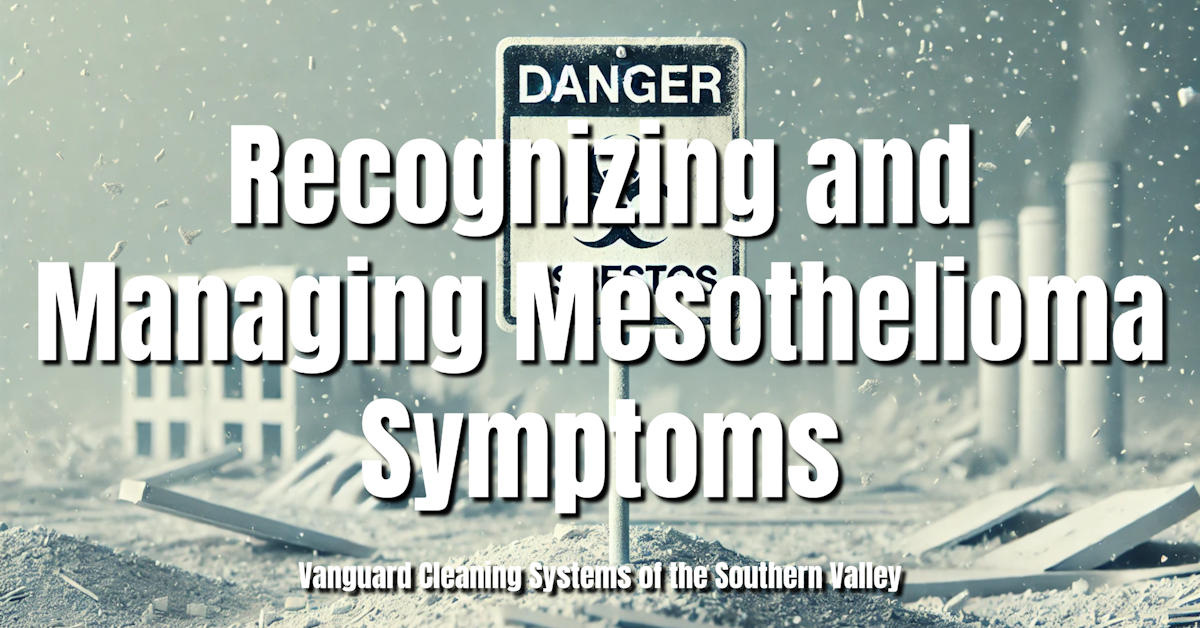Early detection of mesothelioma, a cancer linked to asbestos exposure, can save lives and improve treatment outcomes.

The Importance of Early Detection and Medical Guidance in Mesothelioma
Mesothelioma, a rare and aggressive cancer, is primarily caused by exposure to asbestos fibers.
This dangerous material, once widely used in construction and manufacturing, can lead to severe health issues when its fibers are inhaled or ingested.
Early detection of mesothelioma is crucial for effective symptom management and improved patient outcomes.
Recognizing symptoms early can impact the treatment and quality of life for those affected.
Professional medical guidance is essential for accurately identifying mesothelioma symptoms and facilitating timely intervention and tailored treatment plans.
Symptoms by Type of Mesothelioma
Pleural Mesothelioma Symptoms
- Respiratory difficulties, including shortness of breath and persistent coughing.
- Chest pain localized around the chest and lower back.
- Other symptoms include swelling of the face and arms and hoarseness.
Peritoneal Mesothelioma Symptoms
- Abdominal pain and tenderness in the abdominal region.
- Fluid buildup (ascites) causing noticeable swelling.
- Digestive issues, including nausea, vomiting, and constipation.
Pericardial Mesothelioma Symptoms
- Chest pain around the heart and general chest area.
- Heart palpitations and difficulty breathing.
- Other symptoms often mistaken for other heart conditions.
Testicular Mesothelioma Symptoms
- Lump in the scrotum.
- Swollen testes and testicular pain.
- Symptoms similar to other common testicular issues.
Stages of Mesothelioma Symptoms
Early-Stage Symptoms
- Fatigue and general malaise.
- Mild chest or abdominal pain.
- Shortness of breath and slight respiratory difficulties.
- Unexplained weight loss.
Late-Stage Symptoms
- Severe chest or abdominal pain.
- Significant respiratory complications, including difficulty breathing.
- Pronounced weight loss and muscle wasting.
- Anemia and other systemic symptoms indicating cancer spread to other organs.
When to See a Doctor
- History of Asbestos Exposure: Individuals with a known history of asbestos exposure should seek medical advice even if symptoms are mild or seemingly unrelated. Early consultation is crucial for monitoring potential asbestos-related conditions and initiating timely interventions.
- Persistent Symptoms: If you experience persistent symptoms such as chest or abdominal pain, shortness of breath, or unexplained weight loss, consult a healthcare professional. These symptoms could indicate mesothelioma or another serious condition.
- Unresolved Respiratory Issues: Seek medical attention if you have ongoing respiratory difficulties that do not improve with standard treatments. Chronic respiratory issues can be a sign of mesothelioma.
- Routine Check-ups: Regular screenings are crucial for those at risk to detect any early signs of mesothelioma and other asbestos-related conditions. Early detection can improve treatment outcomes and quality of life.
Managing Mesothelioma Symptoms
- Palliative Therapies: Utilize palliative care to relieve symptoms and improve quality of life. Treatments such as pain management, oxygen therapy, and anti-nausea medications can help alleviate discomfort.
- Traditional Treatment Options: Explore conventional treatments like surgery, chemotherapy, and radiation therapy. These treatments aim to control the spread of mesothelioma and reduce symptom severity.
- Supportive Therapies: Incorporate supportive therapies, such as nutrition counseling, physical therapy, and psychological support. These therapies help manage symptoms and enhance overall well-being.
- Pain Management: Implement comprehensive pain management strategies. This can include medications, nerve blocks, and alternative therapies like acupuncture to help control pain effectively.
- Complementary Therapies: Consider complementary therapies such as massage, meditation, and acupuncture. These therapies can help manage symptoms and improve the patient’s quality of life.
- Regular Monitoring: Schedule regular follow-ups with healthcare providers to monitor the progression of the disease and adjust treatment plans as needed. Continuous monitoring ensures that symptoms are managed effectively and treatments are optimized.
The Role of Cleanliness and Hygiene in Prevention and Care
- Prevention of Secondary Infections: Maintaining a clean environment is essential to prevent secondary infections in mesothelioma patients. Regular sanitization of surfaces, proper waste disposal, and sanitization of personal items reduce the risk of infections that can complicate the patient’s condition.
- Reducing Exposure to Respiratory Irritants: Keeping the environment free from dust, mold, and other respiratory irritants is crucial. Regular cleaning, using HEPA filters, and ensuring good ventilation help minimize exposure to substances that can worsen respiratory symptoms.
- Improving Overall Health and Comfort: A clean and hygienic living space contributes to the overall well-being of mesothelioma patients. It enhances their comfort, reduces stress, and supports better physical health, which is vital for managing the disease and improving quality of life.
- Supporting Immune Function: Cleanliness and hygiene practices help support the immune system by reducing the load of pathogens and allergens in the environment. This is especially important for mesothelioma patients whose immune systems may be compromised by the disease or its treatments.
References
- Selby, K. (2013). The Most Common Mesothelioma Symptoms. Mesothelioma Center - Vital Services for Cancer Patients & Families. https://www.asbestos.com/mesothelioma/symptoms/
Takeaway
Commercial janitorial services play a critical role in asbestos management within commercial buildings.
Their expertise in identifying and safely handling asbestos-containing materials is essential for maintaining a safe environment.
Investing in professional janitorial services not only ensures comprehensive asbestos management but also significantly contributes to the safety and well-being of building occupants.
Continuous education and specialized training for janitorial staff are paramount in upholding high safety standards and effective asbestos mitigation.
By leveraging the skills and knowledge of commercial janitorial services, businesses can better protect their employees and create healthier, safer workplaces.
If you would like more information regarding the effectiveness of high-performance infection prevention and control measures, or if you would like to schedule a free, no-obligation on-site assessment of your facility's custodial needs, contact us today for a free quote!
In Bakersfield, CA, call (661) 437-3253
In Fresno, CA, call (559) 206-1059
In Valencia, CA, or Santa Clarita, CA, call (661) 437-3253
In Palmdale, CA, or Lancaster, CA, call (661) 371-4756

